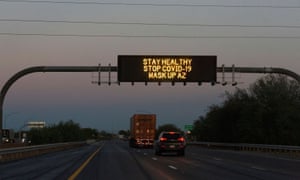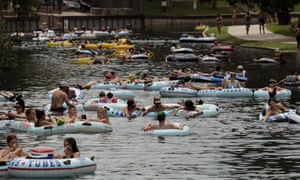Experts say there’s evidence Covid-19 is making a comeback, including rising deaths and hospitalizations in parts of the US

Photograph: Cheney Orr/Reuters
The number of confirmed new coronavirus cases per day in the US hit an all-time high of 40,000 Thursday, according to figures released by Johns Hopkins on Friday, eclipsing the mark first set during one of the deadliest stretches in late April. It’s a resurgence that has led some governors to backtrack or at least pause the reopening of their states.
The news came as the governor of Texas ordered the closing of all bars again and scaled back restaurant dining, in the biggest retreat yet by any state after business reopening.
The move was quickly followed by Florida also announcing bars immediately have to stop serving alcohol.
Halsey Beshears, the head of Florida’s department of business and professional regulatinon, said the policy would be in effect “immediately.”
HalseyBeshears
(@HalseyBeshears)Effective immediately, the Department of Business and Professional Regulation is suspending on premises consumption of alcohol at bars statewide.
June 26, 2020
The announcement came less than an hour after the Florida department of health reported that the state confirmed 8,942 new cases of coronavirus yesterday, breaking a record set earlier this week.
The Florida health department also reported a frightening rise in the rate of positive test results. On Thursday, 13.1% of test results come back positive, compared to 8.9% on Wednesday, confounding Donald Trump’s recent assertions, repeated on Thursday, that “if you did not do testing, you would not have cases”.
On Thursday, Texas had paused its reopening process and was swiftly followed by Arizona, as both states saw a surge of new infections. Florida and California are also seeing record increases.
While the national increase is believed to reflect, in part, greatly expanded testing, experts say there is ample evidence the virus is making a comeback, including rising deaths and hospitalizations in parts of the country, especially in the south and west.
The number of confirmed infections soared past the previous high set on 24 Aprilof 36,400, according to the count kept by Johns Hopkins University.
Deaths from the coronavirus in the US are down to around 600 per day, compared with about 2,200 in mid-April.
Some experts have expressed doubt that deaths will return to that level, in part because of advances in treatment and prevention but also because a large share of the new infections are in younger adults, who are more likely than older ones to survive, although officials have warned that younger people are at risk of then passing the virus on to older friends and relatives who will be less resilient.
The virus is blamed for 124,000 deaths in the US and 2.4m confirmed infections nationwide, by Johns Hopkins’ count.
But US health officials said on Thursday that the true number of Americans infected is about 20 million, or almost 10 times higher. Worldwide, the virus has claimed close to a half-million lives, according to Johns Hopkins.
On Friday, Texas governor Greg Abbott ordered a sharp reversal on reopening. He had pursued one of the most aggressive reopening schedules of any state and had not only resisted calls to order the wearing of masks but had refused until last week to let local governments take such measures.
“It is clear that the rise in cases is largely driven by certain types of activities, including Texans congregating in bars,” he said. “The actions in this executive order are essential to our mission to swiftly contain this virus and protect public health.”
And on Friday, just before the first White House coronavirus taskforce briefing in two months, the White House confirmed reports that Trump canceled his weekend trip his private golf club in Bedminster, New Jersey.
He was severely criticized last month, when he went golfing over Memorial Day weekend as the US coronavirus death toll neared 100,000.
And there had been questions raised about whether Trump would have to self-quarantine in New Jersey because the state is currently requiring those who travel from states with high levels of community spread of coronavirus to do so for 14 days.
Earlier this week, Trump traveled to Arizona, which was included on New Jersey’s list of affected states.

Health experts warned earlier on Friday that the US was not doing enough testing for Covid-19 and that simply pausing reopening plans in some states – as others continue to press ahead – would not be enough to stem the spread of the disease.
“Pausing reopening is not enough. We have got to try to put the horse back in the barn, as it were. We need to start to reverse the opening-up,” Ashish Jha, director of Harvard University’s Global Health Institute, told ABC on Friday morning.
He warned that hospitals face being overwhelmed unless leaders take stronger measures to slow the spread.
Jha urged more testing, saying the US was not doing enough, even though it is performing an estimated 500,000 tests per day, after the CDC on Thursday said that there were likely an estimated 10 times as many Americans who have or have had coronavirus than current statistics show.
“They are missing cases because there is not enough testing. They are way below where they need to be,” said Jha.
An ABC/Ipsos poll on Friday showed that 56% of Americans believe the country is opening back up too quickly, with no vaccine and no cure available for Covid-19.
Jha urged Americans to wear face masks in public. “It’s a pretty small step to take to make sure our hospitals don’t get overwhelmed,” he said. Jha said masks do help prevent the spread, despite a high-profile anti-mask backlash in some parts of the country.
Arizona governor Doug Ducey, a Republican, on Thursday declared his state “on pause” as hospitals accelerate toward capacity.
Many governors are retreating to measures they once resisted and striking a more urgent tone.
“I think they’re going to have to,” said Dr Mark McClellan, former head of the Food and Drug Administration. “It doesn’t take most people in a community getting sick to overwhelm healthcare systems.”



